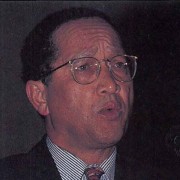A Thinking Man
Chris Freimond profiles South Africa’s new man in Washington.
Some cynics may be tempted to believe Franklin Sonn has been designated South Africa’s next ambassador to the United States simply because he is black and a supporter of President Nelson Mandela’s African National Congress (ANC). They should think again. Sonn (54) has many of the qualities needed by the new generation of South African diplomats. He is a charming intellectual; patriotic to the point of self-sacrifice; believes a market economy and interaction with world markets will best underpin the urgent need for reconstruction and development in his country; and is a committed democrat having seen the effects on South Africa’s people of nearly half a century of repressive white rule. Had he chosen differently Sonn may have ended up in Nelson Mandela’s Cabinet. As one of the country’s leading educators many of his supporters believe Sonn would have made· an excellent Minister of Education, a crucial post in a country where development of the schooling system for blacks was deliberately retarded during the apartheid years. But he decided to remain outside main stream politics although he is a staunch supporter of the ANC. Sonn regards his appointment to Washington as an enormous challenge. The support and encouragement of the US government and private sector in the years ahead will be essential if South Africa’s fledgling democracy is to succeed. Sonn takes over from Ambassador Harry Schwarz, a man of contrasting temperament, but matching commitment, who pioneered a new approach to South African relations with the US after former President F W de Klerk broke with apartheid in 1990. Though he admits that Schwarz will be a hard act to follow, Sonn’s task will be similar and there is little doubt that he will succeed. He must convince the US that South Africa has the potential to not only solve its own socio-economic problems, but also those of much of Africa – provided it has the support of a sympathetic world community. Though not a career diplomat Sonn has the all-round skills that set him apart from many political appointees. He was born in Vosburg, a small town in the northern Cape Province’s sheep farming region. He grew up and was educated at Queenstown in the Eastern Cape province and in Cape Town. Both his parents were educators. He trained as a teacher and became rector of Cape Town’s Peninsula Technikon – then a tertiary education institution for coloured students – when he was only 39. His concern for the social wellbeing of politically disadvantaged communities drew him into the politics of the teaching profession. From 1975 to 1991 he was president of the Cape Teachers’ Professional Association (CTPA), a predominantly coloured organisation. From 1978-1991 he was president of the Union of Teachers’ Associations of South Africa. It was within these associations that Sonn honed his political skills. With many of the recognised black political leaders in jailor exiled, professional organisations were inevitably transformed into arenas of political struggle. He has said the CTPA had no option other than to respond to the needs of the community it served – and those needs were for political change. Sonn based his involvement on the firm belief that democracy was the inevitable solution to the country’s political nightmare. His contribution was acknowledged by a future President Mandela in a letter from his prison cell in which he praised Sonn’s efforts.
The unbanning of black political groups and the release from jail and return from exile of political leaders in 1990 allowed Sonn to take a step back from direct political involvement. He decided to concentrate on serving community and business organisations. He joined the boards of major South African corporations including the banking group Nedbank and the life assurance giant Metropolitan Life. More recently he became an executive director of New Africa Investments Limited, a newly-established industrial holding company controlled by black shareholders.
Sonn’s diplomatic skills were tested in 1992 when he served on former US president Jimmy Carter’s team that monitoredZambia’s general election. Last year he was appointed to the new board of governors of the South African Broadcasting Corporation, the state-controlled radio and television company. He was to have helped restructure a service that had been badly skewed for propaganda purposes under white rule.But he quit to join the ANC’s election battle against De Klerk’s National Party in the Western Cape province. The regional ANC leader Allan Boesak was unable to head-off what seemed like impending defeat in the region. As it was the ANC lost the province to the NP, but Sonn had aligned himself too closely with the party to return to the SABC board. Nevertheless he remained outside active party politics and put his energy into his business interests. With Washington destined to be his home forthe next few years his many talents will not be wasted. Sonn is married and he and his wife Joan have two children. His leisure activities include squash, tennis, an active interest in rugby and hiking.
South Africa, The Journal of Trade, Industry and Investment
Publisher, David Altman
Writer, Chris Freimond



